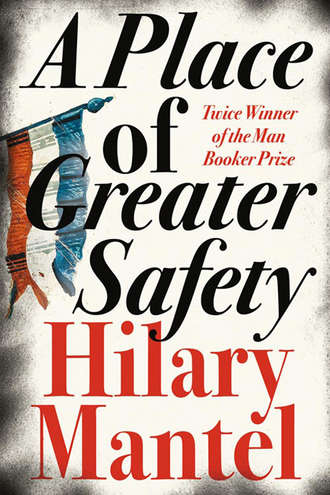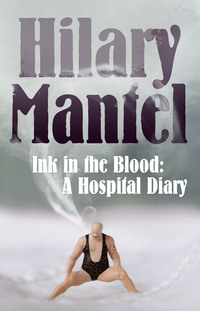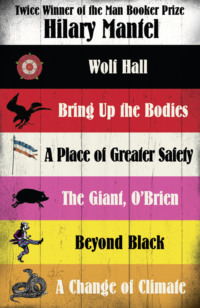
Полная версия
A Place of Greater Safety
But now the nobility, the second Estate of the Realm, had disowned him. He would have no seat. He would have no voice. Or so they thought.
It was all complicated by the fact that last summer there had appeared a scandalous book called A Secret History of the Court at Berlin. It dealt in some detail with the seamier side of the Prussian set-up and the sexual predilections of its prominent members. However strenuously he denied authorship, it was plain to everyone that the book was based on his observations during his time as a diplomat. (Diplomat, him? What a joke.) Strictly, he was not at fault: had he not given the manuscript to his secretary, with orders not to part with it to anyone, especially not to himself? How could he know that his current mistress, a publisher’s wife, was in the habit of picking locks and rifling his secretary’s desk? But that was not quite the sort of excuse that would satisfy the government. And besides, in August he had been very, very short of money.
The government should have been more understanding. If they had given him a job last year, instead of ignoring him – something worthy of his talents, say the Constantinople embassy, or Petersburg – then he would have burned A Secret History, or thrown it in a pond. If they had listened to his advice, he wouldn’t be getting ready, now, to teach them the hard way.
So the Nobility rejected him. Very well. Three days ago he had entered Aix-en-Provence as a candidate for the Commons, the Third Estate. What resulted? Scenes of wild enthusiasm. ‘Father of his Country’, they had called him; he was popular, locally. When he got to Paris those bells of Aix would still be ringing jubilee, the night sky of the south would still be criss-crossed by the golden scorch-trails of fireworks. Living fire. He would go to Marseille (taking no chances) and get a reception in no way less noisy and splendid. Just to ensure it, he would publish in the city an anonymous pamphlet in praise of his own character and attributes.
So what’s to be done with these worms at Versailles? Conciliate? Calumniate? Would they arrest you in the middle of a General Election?
A PAMPHLET by the Abbé Sieyès, 1789:
What is the Third Estate?
Everything.
What has it been, until now?
Nothing.
What does it want?
To become something.
THE FIRST Electoral Assembly of the Third Estate of Guise, in the district of Laon: 5 March 1789. Maître Jean-Nicolas Desmoulins presiding, as Lieutenant-General of the Bailiwick of Vermandois: assisted by M. Saulce, Procurator: M. Marriage as Secretary: 292 persons present.
In deference to the solemnity of the occasion, M. Desmoulins’s son had tied his hair back with a broad green ribbon. It had been a black ribbon earlier that morning, but he had remembered just in time that black was the colour of the Hapsburgs and of Antoinette, and that was not at all the kind of partisanship he wished to display. Green, however, was the colour of liberty and the colour of hope. His father waited for him by the front door, fuming at the delay and wearing a new hat. ‘I never know why Hope is accounted a virtue,’ Camille said. ‘It seems so self-serving.’
It was a raw, blustery day. On the rue Grand-Pont, Camille stopped and touched his father’s arm. ‘Come to Laon with me, to the district assembly. Speak for me. Please.’
‘You think I should stand aside for you?’ Jean-Nicolas said. ‘The traits which the electors will prefer in me, are not the ones you have inherited. I am aware that there are certain persons in Laon making a noise on your behalf, saying you must know your way about and so on. Just let them meet you, that’s all I say. Just let them try to have a five-minute normal conversation with you. Just let them set eyes on you. No, Camille, in no way will I be party to foisting you on the electorate.’
Camille opened his mouth to reply. His father said, ‘Do you think it is a good idea to stand about arguing in the street?’
‘Yes, why not?’
Jean-Nicolas took his son’s arm. Not very dignified to drag him to the meeting, but he’d do it if necessary. He could feel the damp wind penetrating his clothes and stirring aches and pains in every part. ‘Come on,’ he snapped, ‘before they give us up for lost.’
‘Ah, at last,’ the de Viefville cousins said. Rose-Fleur’s father looked Camille over sourly. ‘I had rather hoped not to see you, but I suppose you are a member of the local Bar, and your father pointed out that we could not very well disenfranchise you. This may, after all, be your only chance to play any part in the nation’s affairs. I hear you’ve been writing,’ he said. ‘Pamphleteering. Not, if I may say so, a gentleman’s method of persuasion.’
Camille gave M. Godard his best, his sweetest smile. ‘Maître Perrin sends his regards,’ he said.
After the meeting nothing remained except for Jean-Nicolas to go to Laon to collect a formal endorsement. Adrien de Viefville, the Mayor of Guise, walked home with them. Jean-Nicolas seemed dazed by his easy victory; he’d have to start packing for Versailles. He stopped as they crossed the Place des Armes and stood looking up at his house. ‘What are you doing?’ his relative asked.
‘Inspecting the guttering,’ Jean-Nicolas explained.
By next morning everything had fallen apart. Maître Desmoulins did not appear for breakfast. Madeleine had anticipated the festive chink of coffee cups, congratulations all round, perhaps even a little laughter. But those children who remained at home all had colds, and were coddling themselves, and she was left to preside over one son, whom she did not know well enough to talk to, and who did not eat breakfast anyway.
‘Can he be sulking?’ she asked. ‘I didn’t think he’d sulk, today of all days. This comes of apeing royalty and having separate bedrooms. I never know what the bastard’s thinking.’
‘I could go and find him,’ Camille suggested.
‘No, don’t trouble. Have some more coffee. He’ll probably send me a note.’
Madeleine surveyed her eldest child. She put a piece of brioche into her mouth. To her surprise, it stuck there, like a lump of ash. ‘What has happened to us?’ she said. Tears welled into her eyes. ‘What has happened to you?’ She could have put her head down on the table, and howled.
Presently word came that Jean-Nicolas was unwell. He had a pain, he said. The doctor arrived, and confined him to bed. Messages were sent to the mayor’s house.
‘Is it my heart?’ Desmoulins inquired weakly. If it is, he was about to say, I blame Camille.
The doctor said, ‘I’ve told you often enough where your heart is, and where your kidneys are, and what is the state of each; and while your heart is perfectly sound, to set out for Versailles with kidneys like those is mere folly. You will be sixty in two years – if, and only if, you take life quietly. Moreover –’
‘Yes? While you’re about it?’
‘Events in Versailles are more likely to give you a heart attack than anything your son has ever done.’
Jean-Nicolas dropped his head back against the pillows. His face was yellow with pain and disappointment. The de Viefvilles gathered in the drawing room below, and the Godards, and all the electoral officials. Camille followed the doctor in. ‘Tell him it’s his duty to go to Versailles,’ he said. ‘Even if it kills him.’
‘You always were a heartless boy,’ said M. Saulce.
Camille turned to break into a clique of de Viefvilles. ‘Send me,’ he said.
Jean-Louis de Viefville des Essarts, advocate, Parlementaire, surveyed him through his pince-nez. ‘Camille,’ he said, ‘I wouldn’t send you down to the market to fetch a lettuce.’
ARTOIS: the three Estates met separately, and the assemblies of the clergy and the nobility each indicated that in this time of national crisis they would be prepared to sacrifice some of their ancient privileges. The Third Estate began to propose an effusive vote of thanks.
A young man from Arras took the floor. He was short and slightly built, with a conspicuously well-cut coat and immaculate linen. His face was intelligent and earnest, with a narrow chin and wide blue eyes masked behind spectacles. His voice was unimpressive, and half-way through his speech it died momentarily in his throat; people had to lean forward and nudge their neighbours to know what he said. But it was not the manner of his delivery that caused them consternation. He said that the clergy and the nobility had done nothing praiseworthy, but had merely promised to amend where they had abused. Therefore, there was no need to thank them at all.
Among people who were not from Arras, and did not know him, there was some surprise when he was elected one of the eight deputies for the Third Estate of Artois. He seems locked into himself, somehow not amenable; and he has no orator’s tricks, no style, nothing about him at all.
‘I NOTICE you’ve paid off your tailor,’ his sister Charlotte said. ‘And your glove-maker. And you said he was such a good glove-maker too. I wish you wouldn’t go around town as if you’ve decided to leave for good.’
‘Would you prefer it if I climbed through the window one night with all my possessions done up in a spotted handkerchief? You could tell them I’d run away to sea.’
But Charlotte was not to be mollified: Charlotte, the family knife. ‘They’ll want you to settle things before you go.’
‘You mean about Anaïs?’ He looked up from the letter he was writing to an old schoolfriend. ‘She’s said she’s happy to wait.’
‘She’ll not wait. I know what girls are like. My advice to you is to forget her.’
‘I am always glad of your advice.’
She threw her head up and glared, suspecting sarcasm. But his face expressed only concern for her. He turned back to his letter:
Dearest Camille,
I flatter myself you won’t be very surprised to learn I’m on my way to Versailles. I can’t tell you how much I’m looking forward …
MAXIMILIEN de Robespierre, 1789, in the case of Dupond:
The reward of the virtuous man is his confidence that he has willed the good of his fellow man: after that comes the recognition of the nations, which surrounds his memory, and the honours given him by contemporaries … I should like to buy these rewards, at the price of a laborious life, even at the price of a premature death.
PARIS: on 1 April, d’Anton went out to vote at the church of the Franciscans, whom the Parisians called the Cordeliers. Legendre the master butcher walked down with him – a big, raw, self-educated man who was in the habit of agreeing with anything d’Anton said.
‘Now a man like you …’ Fréron had said, with careful flattery.
‘A man like me can’t afford to stand for election,’ d’Anton said. ‘They’re giving the deputies, what, an eighteen-franc allowance per session? And I’d have to live in Versailles. I’ve a family to support, I can’t let my practice lie fallow.’
‘But you’re disappointed,’ Fréron suggested.
‘Maybe.’
The voters didn’t go home; they stood in groups outside the Cordeliers’ church, gossiping and making predictions. Fabre didn’t have a vote because he didn’t pay enough taxes; the fact was making him spiteful. ‘Why couldn’t we have the same franchise as the provinces?’ he demanded. ‘I’ll tell you what it is, they regard Paris as a dangerous city, they’re afraid of what would happen if we all had votes.’ He engaged in seditious conversation with the truculent Marquis de Saint-Huruge. Louise Robert closed the shop and came out on François’s arm, wearing rouge and a frock left over from better days.
‘Think what would happen if women had votes,’ she said. She looked up at d’Anton. ‘Maître d’Anton believes women have a lot to contribute to political life, don’t you?’
‘I do not,’ he said mildly.
‘The whole district’s out,’ Legendre said. He was pleased. He had spent his youth at sea; now he liked to feel he belonged to a place.
Mid-afternoon, a surprise visitor: Hérault de Séchelles.
‘Thought I’d drop down to see how you Cordeliers wild men were voting,’ he said; but d’Anton had the impression he’d come to look for him. Hérault took a pinch of snuff from a little box with a picture of Voltaire on the lid. He turned the box in his fingers, appreciatively; proffered it to Legendre.
‘This is our butcher,’ d’Anton said, enjoying the effect.
‘Charmed,’ Hérault said, not a flicker of surprise on his amiable features; but afterwards d’Anton caught him surreptitiously checking his cuffs to see if they were free of ox-blood and offal. He turned to d’Anton: ‘Have you been to the Palais-Royal today?’
‘No, I hear there’s some trouble …’
‘That’s right, keep yourself in the clear,’ Louise Robert muttered.
‘So you’ve not seen Camille?’
‘He’s in Guise.’
‘No, he’s back. I saw him yesterday in the company of the ineffably verminous Jean-Paul Marat – oh, you don’t know the doctor? Not such a loss – the man has a criminal record in half the countries in Europe.’
‘Don’t hold that against a man,’ d’Anton said.
‘But he has, you know, a long history of imposing on people. He was physician to the Comte d’Artois’s household troops, and it’s said he was the lover of a marquise.’
‘Naturally, you don’t believe that.’
‘Look, I can’t help my birth,’ Hérault said, with a flash of irritation. ‘I try to atone for it – perhaps you think I should imitate Mlle de Kéralio and open a shop? Or your butcher might take me on to scrub the floors?’ He broke off. ‘Oh, really, one shouldn’t be talking like this, losing one’s temper. It must be the air in this district. Be careful, Marat will be wanting to move in.’
‘But why is this gentleman verminous? You mean it as a figure of speech?’
‘I mean it literally. This man abandoned his life, walked out, chooses to live as some sort of tramp.’ Hérault shuddered; the story had a horrible grip on his imagination.
‘What does he do?’
‘He appears to have dedicated himself to the overthrowing of everything.’
‘Ah, the overthrowing of everything. Lucrative business, that. Business to put your son into.’
‘What I am telling you is perfectly true – but look now, I’m getting diverted. I came to ask you to do something about Camille, as a matter of urgency –’
‘Oh, Camille,’ Legendre said. He added a phrase he had seldom used since his merchant navy days.
‘Well, quite,’ Hérault said. ‘But one doesn’t want to see him taken up by the police. The Palais-Royal is full of people standing on chairs making inflammatory speeches. I don’t know if he is there now, but he was there yesterday, and the day before –’
‘Camille is making a speech?’
This seemed unlikely: and yet, possible. A picture came into d’Anton’s mind. It was some weeks ago, late at night. Fabre had been drinking. They had all been drinking. Fabre said, we are going to be public men. He said, d’Anton, you know what I told you about your voice when we first met, when you were a boy? I told you, you’ve got to be able to speak for hours, you’ve got to fetch up your voice from here, from here – well, you’re good, but you’re not that good yet. Courtrooms are one thing, but we’re growing out of courtrooms.
Fabre stood up. He placed his fingertips on d’Anton’s temples. ‘Put your fingers here,’ he said. ‘Feel the resonance. Put them here, and here.’ He jabbed at d’Anton’s face: below the cheekbones, at the side of his jaw. ‘I’ll teach you like an actor,’ he said. ‘This city is our stage.’
Camille said: ‘Book of Ezekiel. “This city is the cauldron, and we the flesh.”’
Fabre turned. ‘This stutter,’ he said. ‘You don’t have to do it.’
Camille put his hands over his eyes. ‘Leave me alone;’ he said.
‘Even you.’ Fabre’s face was incandescent. ‘Even you, I am going to teach.’
He leapt forward, wrenched Camille upright in his chair. He took him by the shoulders and shook him. ‘You’re going to talk properly,’ Fabre said. ‘Even if it kills one of us.’
Camille put his hands protectively over his head. Fabre continued to perpetrate violence; d’Anton was too tired to intervene.
Now, in bright sunlight, on an April morning, he wondered if this scene could really have occurred. Nevertheless, he began to walk.
THE GARDENS of the Palais-Royal were full to overflowing. It seemed to be hotter here than anywhere else, as if it were high summer. The shops in the arcades were all open, doing brisk business, and people were arguing, laughing, parading; the stockbrokers from the bourse had wrenched their cravats off and were drinking lemonade, and the patrons of the cafés had spilled into the gardens and were fanning themselves with their hats. Young girls had come out to take the air and show off their summer dresses and compare themselves with the prostitutes, who saw chances of midday trade and were out in force. Stray dogs ran about grinning; broadsheet sellers bawled. There was an air of holiday: dangerous holiday, holiday with an edge.
Camille stood on a chair, the light breeze fanning out his hair. He was holding a piece of paper, and was reading from what appeared to be a police file. When he had finished he held the piece of paper at arm’s length between finger and thumb and released it to let it flutter to the ground. The crowd hooted with laughter. Two men exchanged glances and melted away from the back of the crowd. ‘Informers,’ Fréron said. Then Camille spoke of the Queen with cordial contempt, and the crowd hissed and groaned; he spoke of delivering the King from evil advisers, and praised M. Necker, and the crowd clapped its hands. He spoke of Good Duke Philippe and his concern for the people, and the crowd threw its hat into the air and cheered.
‘They’ll arrest him,’ Hérault said.
‘What, in the face of this crowd?’ Fabre said.
‘They’ll pick him up afterwards.’
D’Anton looked very grave. The crowd was increasing. Camille’s voice reached out to them without a trace of hesitation. By accident or design he had developed a marked Parisian accent. People were drifting over from across the gardens. From the upper window of a jeweller’s shop, the Duke’s man Laclos gazed down dispassionately, sipping from time to time from a glass of water and jotting down notes for his files. Hot, getting hotter: Laclos alone was cool. Camille flicked his fingers across his forehead, brushing the sweat away. He launched into grain speculators. Laclos wrote, ‘The best this week.’
‘I’m glad you came to tell us, Hérault,’ d’Anton said. ‘But I don’t see any chance of stopping him now.’
‘It’s all my doing,’ Fabre said. His face shone with pleasure. ‘I told you, you have to take a firm line with Camille. You have to hit him.’
THAT EVENING, as Camille was leaving Fréron’s apartment, two gentlemen intercepted him and asked him politely to accompany them to the Duc de Biron’s house. A carriage was waiting. On the way, no one spoke.
Camille was glad of this. His throat hurt. His stutter had come back. Sometimes in court he had managed to lose it, when he was caught up in the excitement of a case. When he was angry it would go, when he was beside himself, possessed; but it would be back. And now it was back, and he must revert to his old tactics: he couldn’t get through a sentence without the need for his mind to dart ahead, four or five sentences ahead, to see words coming that he wouldn’t be able to pronounce. Then he must think of synonyms – the most bizarre ones, at times – or he must simply alter what he’s going to say … He remembered Fabre, banging his head rather painfully against the arm of a chair.
The Duc de Biron made only the briefest appearance; he accorded Camille a nod, and then he was whisked through a gallery, away, into the interior of the house. The air was close; sconces diffused the light. On walls of muffling tapestry, dim figures of goddesses, horses, men: woollen arms, woollen hooves, draperies exuding the scent of camphor and damp. The topic was the thrill of the chase; he saw hounds and spaniels with dripping jaws, dough-faced huntsmen in costumes antique: a cornered stag foundered in a stream. He stopped suddenly, gripped by panic, by an impulse to cut and run. One of his escorts took him – quite gently – by the arm and steered him on.
Laclos waited for him in a little room with walls of green silk. ‘Sit down,’ he said. ‘Tell me about yourself. Tell me what was going through your mind when you got up there today.’ Self-contained, constrained, he could not imagine how anyone could parade his raw nerves to such effect.
The Duke’s friend de Sillery drifted in, and gave Camille some champagne. There was no gaming tonight, and he was bored: may as well talk to this extraordinary little agitator. ‘I suppose you have financial worries,’ Laclos said. ‘We could relieve you of those.’
When he had finished his questions he made an imperceptible signal, and the two silent gentlemen reappeared, and the process was reversed: the chill of marble underfoot, the murmur of voices behind closed doors, the sudden swell of laughter and music from unseen rooms. The tapestries had, he saw, borders of lilies, roses, blue pears. Outside the air was no cooler. A footman held up a flambeau. The carriage was back at the door.
Camille let his head drop back against the cushions. One of his escorts drew a velvet curtain, to shield their faces from the streets, Laclos declined supper and returned to his paperwork. The Duke is well-served by crowd-pleasers, he said, by unbalanced brats like that.
ON THE EVENING of 22 April, a Wednesday, Gabrielle’s year-old son refused his food, pushed the spoon away, lay whimpering and listless in his crib. She took him into her own bed, and he slept; but at dawn, she felt his forehead against her cheek, burning and dry.
Catherine ran for Dr Souberbielle. ‘Coughing?’ said the doctor. ‘Still not eaten? Well, don’t fuss. I don’t call this a healthy time of year.’ He patted her hand. ‘Try to get some rest yourself, my dear.’
By evening there was no improvement. Gabrielle slept for an hour or two, then came to relieve Catherine. She wedged herself into an upright chair, listening to the baby’s breathing. She could not stop herself touching him every few minutes – just a fingertip on cheek, a little pat to the sore chest.
By four o’clock he seemed better. His temperature had dropped, his fists unclenched, his eyelids drooped into a doze. She leaned back, relieved, her limbs turned to jelly with fatigue.
The next thing she heard was the clock striking five. Wrenched out of a dream, she jerked in her chair, almost fell. She stood up, sick and cold, steadying herself with a hand on the crib. She leaned over it. The baby lay belly-down, quite still. She knew without touching him that he was dead.
AT THE CROSSROADS of the rue Montreuil and the Faubourg Saint-Antoine there was a great house known to the people who lived there as Titonville. On the first floor were the (allegedly sumptuous) apartments occupied by one M. Réveillon. Below ground were vast cellars, where notable vintages appreciated in the dusk. On the ground floor was the source of M. Réveillon’s wealth – a wallpaper factory employing 350 people.
M. Réveillon had acquired Titonville after its original owner went bankrupt; he had built up a flourishing export trade. He was a rich man, and one of the largest employers in Paris, and it was natural that he should stand for the Estates-General. On 24 April he went with high hopes to the election meeting of the Sainte-Marguerite division, where his neighbours listened to him with deference. Good man, Réveillon. Knows his stuff.
M. Réveillon remarked that the price of bread was too high. There was a murmur of agreement and a little sycophantic applause: as if the observation were original. If the price of bread were to come down, M. Réveillon said, employers could cut wages; this would lead to a reduction in the price of manufactured articles. Otherwise, M. Réveillon said, where would it all end? Prices up, wages up, prices up, wages up …
M. Hanriot, who owned the saltpetre works, warmly seconded these observations. People lounged near the door, and handed out scraps of news to the unenfranchised, who stood outside in the gutter.








